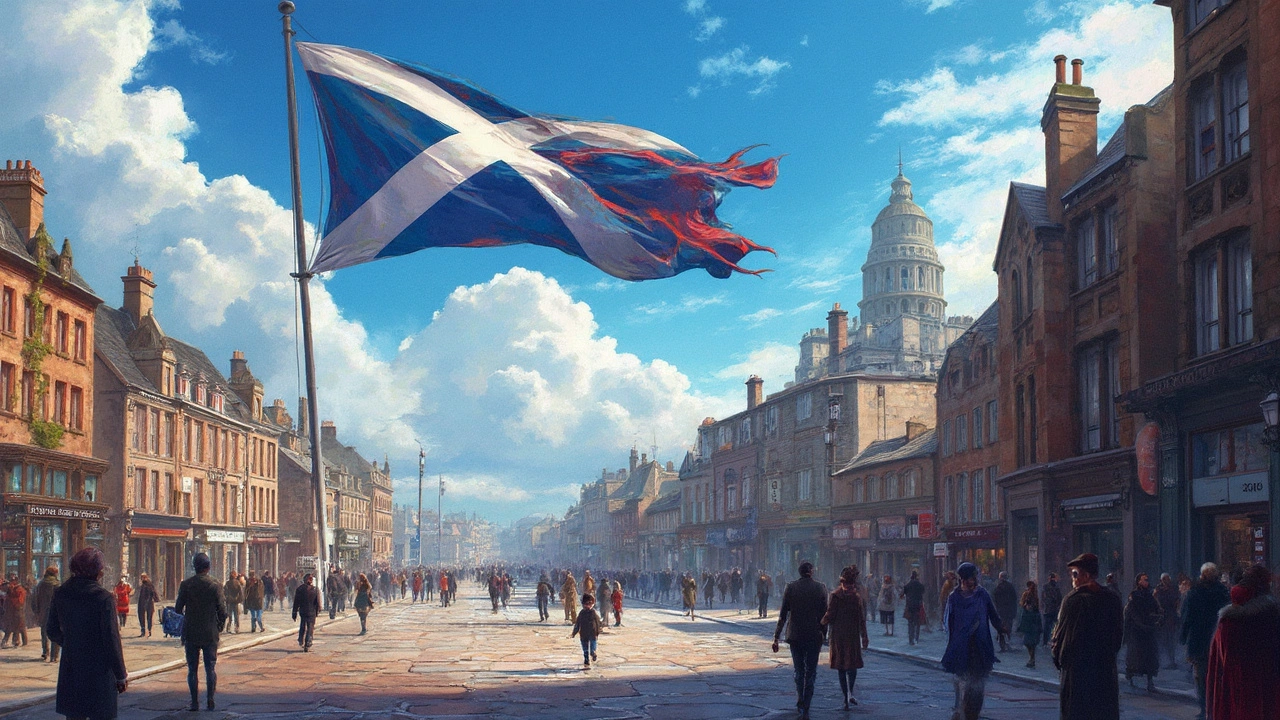
The Quest for Independence: A Journey Through Time
Scotland's journey toward independence from the UK has been nothing short of dramatic. Picture a nation with a fierce sense of identity, battling its way through political challenges to carve out its own future. This aspiration for self-governance isn't brand new; it stretches back decades. The 2014 referendum marks a significant milestone, where 55% voted against leaving the UK. But that wasn't the end of it. Fast forward to the 2022 referendum, and the tide seems to be shifting. Now, in 2025, people are more eager than ever to see where Scotland stands on this quest.
Why the continuous push for independence, you ask? It’s a mix of cultural pride and political divergence. Scotland's seen diverging political paths from the rest of the UK, particularly after Brexit, which Scotland largely voted against. These are more than just stats; they represent a growing disconnect from Westminster.
The Scottish government's role has been pivotal. Under First Minister Nicola Sturgeon, the push for independence took on a renewed vigor post-Brexit. The Scottish National Party (SNP), consistently advocating for independence, believes that Scotland could fare better tackling issues like healthcare, education, and the economy on its own. This move isn't just about breaking political ties—it's about building a nation that reflects its populace's values and needs.
The SNP’s argument often highlights how a sovereign Scotland could rejoin the EU, fostering better trade relationships and boosting the economy. Consider the potential return of freedom of movement and access to the European Single Market. Critics, however, caution about economic uncertainties and currency issues. Would Scotland create its own currency, continue using the pound, or adopt the euro? These are crucial questions voters and leaders must tackle.

The Players and Their Roles in Scotland's Potential Independence
In any significant political shift, various players pull the strings. In Scotland's case, it’s a mix of individuals, parties, and international voices. Right now, Nicola Sturgeon stands as a bold proponent of independence, articulating visions of a future where Scotland thrives independently. Her leadership is backed by the SNP and a growing contingent who question the benefits of remaining in the UK.
Then there’s the opposition. The Scottish Conservative Party, Scottish Labour, and Liberal Democrats are generally against independence. They argue that unity brings more strength, particularly concerning defense, currency, and global influence. It's not just about internal players—international voices have also waded into the debate. EU leaders are subtly supportive, viewing Scotland as potentially returning to the fold. On the flip side, some global leaders, wary of secessionist movements in their own countries, have remained neutral or supportive of maintaining UK's integrity.
The legal path to independence isn't straightforward. It hinges on the UK Parliament's approval to hold a legally binding referendum. So far, this has been elusive. Every step involves negotiations, legal challenges, and, of course, the crucial aspect of public opinion.
There's also the role of media, swaying, informing, and sometimes inflaming public sentiment. Both traditional outlets and social media have created platforms for vigorous debate. Narratives are crafted, broken down, and rebuilt, each side trying to convince, sway, and sometimes polarize. The way the media frames issues like economic impact, cultural identity, and international standing plays a significant role in shaping public perception.

The Implications of Independence: The Road Ahead for Scotland and the UK
If Scotland were to become independent, one major consideration is economic stability. Scotland’s economy is complex, a mix of traditional industries like whisky and modern sectors such as tech. Oil and renewable energies are significant, but independence comes with investment questions and initial economic turbulence. Take the question of currency again: without a clear plan, markets could react unfavorably.
Socially, independence might spur a boost in cultural expression. When people feel recognized and autonomous, it often fosters innovation and creativity. Education and healthcare might model systems more aligned with local values. However, laying the foundations of a new nation isn't free from aches and pains.
Within the UK, Scotland’s independence would likely spur discussions about the current union model. It could re-ignite debates in Northern Ireland and Wales regarding their autonomy and relationship with the UK. The breakup could even affect UK’s global standing and international relationships, raising questions about military alliances and diplomatic footprint.
The road to independence is fraught with hurdles—legal, economic, and social. But Scots have shown resilience and determination. While the outcome remains uncertain, what’s clear is the importance of a well-informed public, strategic leadership, and, ultimately, a shared vision of what independence truly represents.
Comments (10)
-
Ronnie Kaye July 17, 2025
Ah, Scotland and the independence saga — a classic! Honestly, it’s fascinating to see how these debates keep fueling both hope and frustration in equal measure. The 2022 referendum really threw some sparks, didn't it? But the path forward seems as winding and foggy as a Scottish highland morning.
One thing that stands out to me is the role of key players. The political dance between Scottish nationalists and UK government hardliners almost feels like a chess game where the stakes are the future of an entire nation. It makes you wonder what compromises, if any, are actually possible.
Also, I’m curious how the average Scot feels living through all this uncertainty. Is the independence dream worth the potential economic and social upheaval? Or are they mostly just caught in a political tug of war? Either way, I’m watching closely because this doesn’t just affect Scotland and the UK but has echoes in other separatist movements worldwide.
What’s your take? Is an independent Scotland a bright new beginning or a risky leap into the unknown?
-
Priyank Panchal July 20, 2025
Look, I get the emotional appeal behind this independence talk, but let’s cut through the noise here. Scotland is far better off within the UK. The economic stability, international influence, and collective security all degrade with separation.
There are too many risks involved with independence that most people conveniently overlook. For instance, how will Scotland shield itself from market volatility without the UK’s economic heft? And don’t even get me started about trade relationships and currency issues.
National pride and cultural identity are great, but they shouldn’t override practical governance. Scotland should focus on reform and autonomy within the union rather than chasing an idealistic but dangerous dream of independence.
Otherwise, it’s a reckless gamble that may hurt not only them but the UK as a whole.
-
Ian Maggs July 21, 2025
Independence, ah, such a kaleidoscope of profound possibilities and peril!!! The intricate dance between sovereignty and unity calls into question the very fabric of nationalism and identity.
Philosophically, one must ponder: what truly defines a nation? Is it the arbitrary lines drawn and reinforced by political power, or the shared culture and will of its people? Scotland's quest for independence is a living experiment probing these existential questions.
Moreover, the implications ripple beyond mere geography—the socio-economic complexities, the questions of belonging, and ethical responsibility to both the individual and collective.
Undoubtedly, the outcome will set precedent for countless other regions grappling with similar yearnings. This, my friends, is a pivotal juncture worthy of our keenest contemplation!!!
-
Michael Gradwell July 23, 2025
Anyone who thinks Scottish independence is a simple, positive step is missing critical realities. The UK functions as a coherent unit, providing stability, economic strength, and global clout.
Fracturing this union is not a romantic act of liberation; it’s a reckless fragmentation that risks economic chaos and political disruption. Scotland’s much-discussed resources like oil are volatile and insufficient guarantees of future prosperity.
Let's be honest — independence sounds appealing in theory, but the practical consequences would be dire. The Scottish government needs to focus on working productively within the UK framework instead of chasing a disruptive fantasy.
This isn’t mere opinion; it’s a harsh truth too many refuse to face.
-
Flannery Smail July 23, 2025
Honestly, I don't see what's the big deal here. Scotland’s independence? Meh, sounds like a lot of noise over the same old stuff. Borders changing, flag waving, politicians posturing as if they’re heroes of some grand saga.
Realistically, does anyone think life’s gonna change much for the average person? Probably not. Economies will shuffle around, there’ll be bureaucratic headaches, yada yada.
Sometimes, these nationalistic movements feel more like ego trips than practical plans.
But hey, maybe that’s just me being cynical.
-
Emmanuel Sadi July 24, 2025
Oh please, spare me the noble rhetoric about independence. Scotland is just another bit of drama in a tired saga of nationalist delusions.
Let’s be real — how many times can a country run this tired referendum game before it gets old? The ‘political dynamics’ you mention are just people clinging to power and stirring the pot.
They claim it’s about the people, but really it’s just an excuse for some to pursue personal agendas under the guise of patriotism.
Wake me up when there's something genuinely new to discuss instead of the same old circus tactics.
-
Nicholas Carpenter July 26, 2025
I appreciate that this is a deeply complex and sensitive topic, affecting real lives and communities. While opinions vary, it’s crucial we approach the subject with respect and openness.
The 2022 referendum and subsequent developments reveal a passionate desire among many Scots to shape their own future. This should be acknowledged as a valid expression of democratic will.
At the same time, understanding the potential economic, social, and political challenges allows for a more informed dialogue about the best way forward. Independence isn’t just a political slogan; it’s a serious step with far-reaching implications.
Ultimately, fostering cooperation and constructive conversation between Scotland and the rest of the UK serves everyone's best interest.
-
Chuck Doland July 30, 2025
To fully comprehend Scotland’s pursuit of independence, one must analyze it through a multidimensional lens encompassing constitutional law, political philosophy, and international relations.
Independence movements tap into fundamental questions about state sovereignty, the right to self-determination, and the legitimacy of existing political structures.
The situation post-2022 referendum exemplifies these tensions exquisitely, as well as revealing tensions between democratic mandates and legal constraints.
Further, the implications for the United Kingdom’s geopolitical standing and internal cohesion are profound.
Thus, the discourse demands not only emotive engagement but rigorous scholarly inquiry to ascertain pathways that honor democratic aspirations while ensuring stability.
-
Madeline VanHorn August 4, 2025
Honestly, people keep acting like Scottish independence is some grand heroic crusade. Let’s be real for a second. What does it actually mean aside from endless political mess and economic uncertainty?
It seems like a lot of overdramatic fuss over being able to wave a different flag and have separate stamps and stuff. I mean, come on, does that really justify the potential hardships?
Most people just want stability, jobs, and good schools — not constant debates about sovereignty. The independence dream sounds nice, but it might just be a selfish fantasy with little regard for practical realities.
At the end of the day, it's about what works best for ordinary folks.
-
Glenn Celaya August 14, 2025
Yeah, this whole independence thing is just another round of political theater that'll probably just leave most folks confused and worse off. I don't get the hype — the UK has its flaws but it offers stability and resources that Scotland risks losing.
People say it's about identity and pride, but that's just a band-aid for deeper issues nobody wants to face. Do you think all these empty promises about economic freedom will just magically pan out?
I see mostly wishful thinking and political posturing. Rather than celebrating this so-called pursuit as some noble act, we should be critically analyzing who really benefits and who gets hurt.
But hey, that's just my take. Feel free to prove me wrong.
